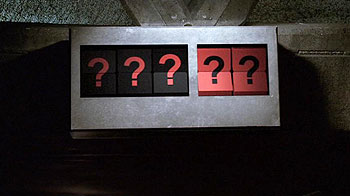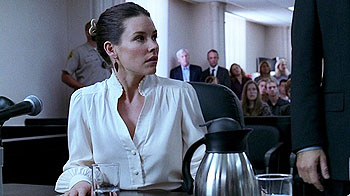In Defense Of Lost
Published on May 30th, 2011 in: Climb Onto The Nearest Star, Issues, Science Fiction, TV |By Paul Casey
“Do you want to know a secret?”

There has been no show with such a commitment to the mystery as Lost. For six years, the producers and writers held their secrets close and chose to reveal only that which would ensure even more questions. Some have described this aspect of the show as if it were a commonly understood negative, often adding an overstated assertion that the producers were simply “making it up as they went along.” This betrays not only a naïve understanding of the realities of network television, but a fundamental confusion as to the nature of Lost: It is and always was a mystery show.
Following a month long re-watching of all six seasons of Lost, on the lovingly assembled DVD collections, I put forward the idea that not only is the mythology of the show more consistent than assumed, but also that it exists as a superior example of long-form story telling.
I will be up front about this: Lost had its problems. The first three seasons were too long, suffering as so many American network shows do, from having to sustain a 20+ episode count. This became most apparent in the third season, when the lack of an end date led to several of the only truly “filler” episodes of the series. And even the worst episode of this run—by the producers’ own admissions—“Stranger in a Strange Land” (Episode 9), still managed to entertain, thanks to the wonderful Matthew Fox.
The producers and writers were also occasionally, shockingly blind as to the worth of certain characters. Kate, perhaps the most obnoxious, badly-written, poorly-acted character in recent television history, stands as a singular commitment to the illusion of a strong female character, despite claims to the contrary in episode commentaries. While genuinely layered, interesting, and well-acted female characters (Ana Lucia, Rousseau) were killed off and others (Sun, Claire) were sidelined, Kate persisted in delivering one horrendous episode after another. There is not a single well-written, relevant, or well-acted episode in Kate’s entire run, throughout all six seasons.

Although hardly the best actor in the Lost ensemble, compare this with how Elizabeth Mitchell managed to take the character of Juliet, who the audience had every reason to hate, and transform her from a villain to a heroine, using her acting skills to address those contradictions. Mitchell allowed her to be hated, and even while the writers were giving her escape clauses (She looks hot in a bikini! Her husband was a piece of shit!) she refused to play a character who ignored her own shortcomings, manipulations, and cruelty. Instead, she presented to the audience a flawed, yet frequently sympathetic person.
Evangeline Lilly, meanwhile, seemed to feel it was enough that her character disliked being reminded that she was a murderer and a criminal—and a selfish, entitled, deluded one at that. So deluded, in fact, that it seems to have carried over to the writers. Is there a worse courtroom scene than the one in “Eggtown” (Season 4, Episode 4)? Her character was so badly executed it’s not even apparent what she means when she proclaims her own innocence. The writers seem to think it means that, “As a result of her ass looking nice in a pair of jeans, to hell with her motivation, her worth as an actor, or as a character.” Her only discernible purpose is as a sex object for the audience, and to facilitate the perpetually dull love triangle between her, Sawyer, and Jack.
Given the otherwise excellent standard the show maintains in the development of male and female characters, this is depressing. It is even more so when one thinks that the excuses regarding her persistence are based on either an intentional or ignorant perversion of what people want in strong female characters. This is Lost’s greatest failing, and one that disrupted my enjoyment of the show more than anything else did.
So how could I love a show with such an atrocious character? Simple. There has been no show like Lost to so joyously embrace its genre(s) and in doing so, tell a story which bypasses cynicism and reaches the gooey center of emotional and creative energy in such a direct and significant way. When they got characters right—which was most of the time—they were as good as any who have appeared on television.
Time limit is exhausted. Please reload the CAPTCHA.